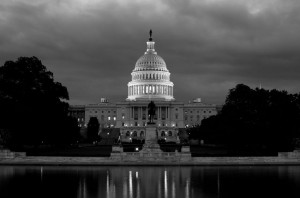On the Hill: Religious Right Fails To Take Down Planned Parenthood
 Photo by orhancam / 123RF
Photo by orhancam / 123RF The presidential election may be over a year away, but certain members of Congress, most of whom belong to the religious right, are once again trying to restrict women’s healthcare options as part of a misguided political ploy that they think will help them in the upcoming election.
What these hard-right government officials don’t seem to understand is the shifting public opinion on this issue: more Americans now identify as pro-choice than pro-life. Women themselves, who are obviously most directly affected by the abortion debate, also tend to be more pro-choice, with 54 percent of American women identifying as such.
But the will of the people has never been very important to the rabid pro-lifers in government, who recently tried and failed to pass a bill which would ban abortions after twenty weeks of pregnancy. While the bill was able to successfully make its way through the notoriously conservative House, it was blocked in the Senate and would surely have been vetoed by President Obama if the legislation had ever made its way to his desk. In fact, the White House issued a statement expressing the President’s opposition to the bill, stating that it “disregards women’s health and rights, the role doctors play in their patients’ healthcare decisions, and the Constitution.”
Essentially, the drama surrounding the bill amounted to a colossal waste of energy, as it never had a chance of becoming the law of the land. Instead, the debate over abortion preoccupied our government at a time when it should have been focusing on funding itself and on the myriad of other issues facing Congress.
Not yet ready to admit defeat, the religious right continued on their anti-women crusade by holding a witch trial of Planned Parenthood President Cecil Richards and by attempting (but failing) to remove federal funding of her organization. The congressional hearing, which more closely resembled a show trial of the Vyshinsky era than a legitimate investigation by democratic representatives, was made up almost entirely of superficial and clearly political questions about the finances of the organization, and also focused on abortions. It’s important to note that due to federal law, abortions cannot be funded with government dollars and less than 3 percent of Planned Parenthood’s expenditures went to abortion services (the rest went to providing maternal and reproductive healthcare for low-income women and to child health services). But that didn’t stop the congressional committee from droning on about abortion in an attempt to discredit the important work that Planned Parenthood does on a daily basis.
The reaction to the “hearing” was swift and nearly universal. Many groups came out in support of Planned Parenthood, including the American Humanist Association, which changed its Facebook profile picture to the #StandWithPP campaign picture and got more than 7,000 likes for doing so. The message to Congress was clear: this is not the 1980s, and attacks on women will not be tolerated.
It’s likely that the religious right still hasn’t learned anything from this unnecessary conflict and will continue to introduce anti-contraception and anti-abortion legislation in the future. Thankfully, Americans seem to be tired of this debate and have made up their minds in support of women’s rights. So while some in Congress continue to push these bills, it’s comforting to know that their actions are purely symbolic and will not further jeopardize the right of women to make their own decisions when it comes to their own bodies.
